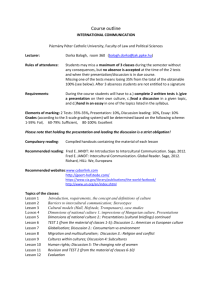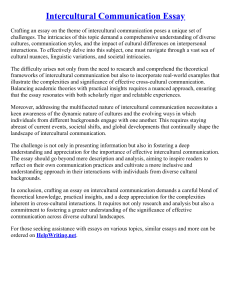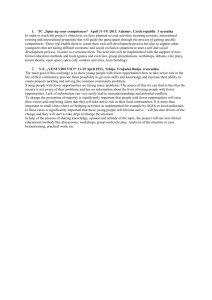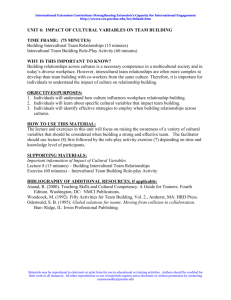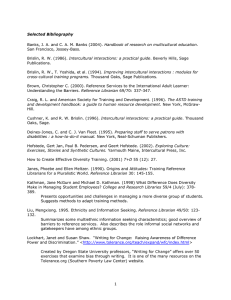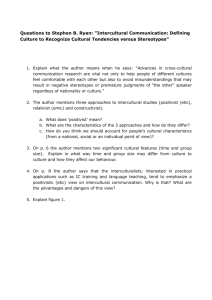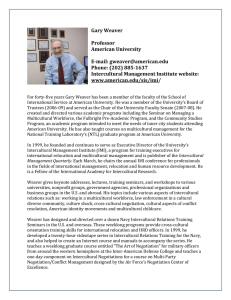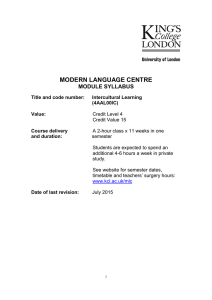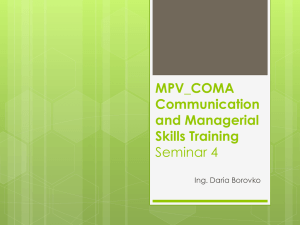culture
advertisement
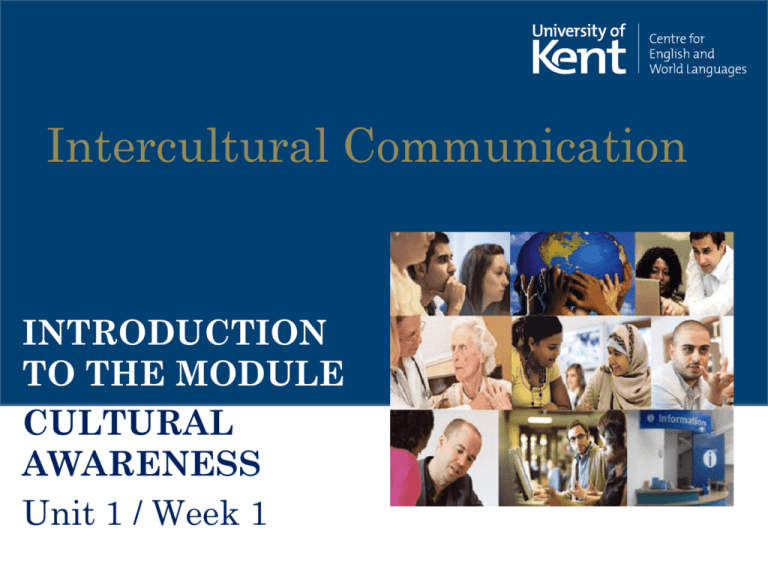
Intercultural Communication INTRODUCTION TO THE MODULE CULTURAL AWARENESS Unit 1 / Week 1 Module Overview Unit 1 – Week 1: Cultural Awareness Unit 2 – Week 2: Cultural Identity – session 1 Unit 2 – Week 3: Cultural Identity – session 2 Unit 3 - Week 4: Cross cultural understanding – session 1 Unit 3 – Week 5: Cross cultural understanding – session 2 Unit 4 – Week 6: Intercultural communication – session 1 Week 7: Reading week Week 8: Tutorials Unit 4 – Week 9: Intercultural communication – session 2 Unit 4 – Week 10: Intercultural communication – session 3 Unit 5 – Week 11: Reflection – Intercultural competence Week 12: Presentations Overview of Assessments Week 8 ESSAY (1,500 words) 40% Individual essay. Week 9 Reflective Journal 30% On-going assessment throughout the module. Students contribute to a blog over 6 weeks (6x5%=30%). Late submissions will be capped. Week 12 Group project Presentation 30% Based on a group project. Outline of Assessments Essay: Reflective Journal: Group project presentation: What is culture? • “Culture or Civilization, taken in its widest ethnographic sense, is that complex whole which includes knowledge, belief, art, morals, custom, and any other capabilities and habits acquired by man as a member of society” Tylor 1968 [1871] What is culture? • “Culture is defined as a system of shared values and beliefs which gives us a sense of belonging or identity. Culture can be discussed in terms of ways in which people pertaining to a group, society or organisation behave, communicate and think, and perceive reality. Each culture exhibits people’s perceptions of reality”. (Weaver, 2000) Why is it important? • Culture has certain characteristics – learned, transmitted through generations, symbolic and changeable over time. • Culture is Ethnocentric; and has both visible and invisible attributes • Cultural Perspectives: Emic vs etic • Need to be culturally aware in order to be able to interpret someone’s behaviour relative to its cultural context. Cultural Intelligence • Accept that your own perceptions are coloured by your own culture • Empathise with the views of others • Actively try to understand other cultures and cultural complexity • Be open-minded – don’t stereotype How to subscribe to the blog Step 1 - Go to: http://talkingcultures.blogspot.co.uk Step 2 – Click on ‘Subscribe’ button on the top right hand side of the page References Hofstede, Geert (1980) Culture’s Consequences: International Differences in Work-Related Values. Beverly Hills CA: Sage Publications. Hofstede, Geert (2001) Culture’s Consequences, (Second Edition): Comparing Values, Behaviors, Institutions and Organizations Across Nations. Thousand Oaks CA: Sage Publications. Tylor, Edward B. 1968 [1871] The Science of Culture. In Morton Fried, ed., Readings in Anthropology, vol. II: Cultural Anthropology. New York: Crowell Weaver, G., R. (Ed.). (2000). Culture, communication and conflicts: Readings in intercultural relations (2nd ed.). Boston: Pearson publishing.
